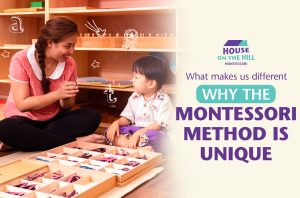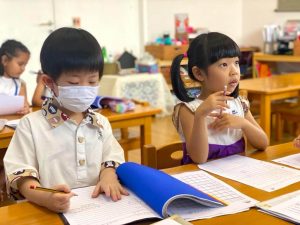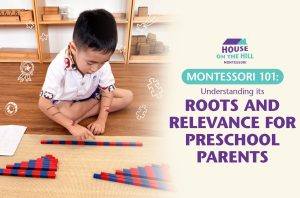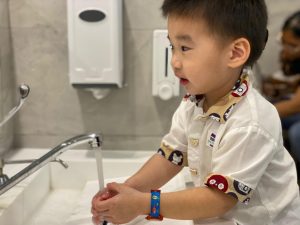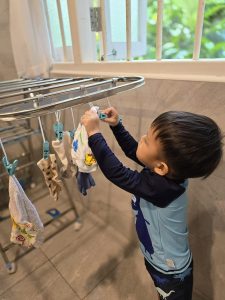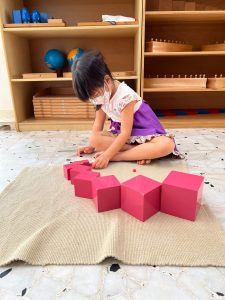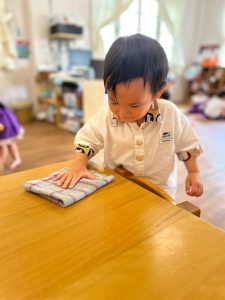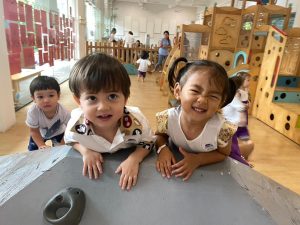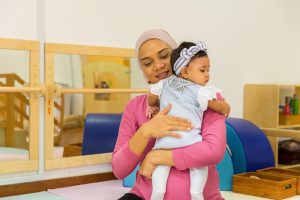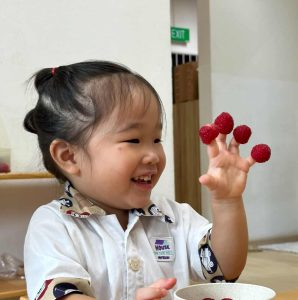
Raising Intuitive Eaters: A Montessori Responsive Feeding Approach
Responsive feeding is a great approach to help children develop healthy habits. Teaching children to choose healthy food is a crucial part of their development, and the Montessori principles indeed offer a supportive framework for this approach by promoting freedom within boundaries and encouraging independence. By integrating these principles, we are teaching children about healthy food choices, educators at House on the Hill lay a strong foundation for lifelong habits of nutritious eating. This approach not only supports physical health but also nurtures important life skills and a positive relationship with food. Are you looking for realistic strategies to help you raise lifelong eaters? Our blog explores your role as a parent or caregiver in feeding your child nourishing food with more confidence and less stress. Karlien Duvenage, from Karlien Dietitian is an experienced Dietitian-Nutritionist with an Masters in Psychology. Karlien supports families in finding nutrition solutions and gaining confidence and peace in how and what to feed their families. She has a special interest in feeding challenges (such as ‘picky’ eating), neurodivergence, and eating disorders. Karlien provided some valuable information to the parents at House on the Hill at our recent parent workshops on Responsive Feeding. What is Responsive Feeding? Responsive Feeding is an approach to feeding that supports children in feeling in control over their bodies, capable and confident around food, and connected with those around them. This creates an environment where children’s curiosity can bloom; they can learn to respond to their bodies’ needs and develop a psychologically healthy relationship with food and their bodies. The responsive feeding framework provides freedom within boundaries and gives caregivers the opportunity to be in charge of feeding without being controlling. Key Values of Responsive Feeding: Autonomy; Relationship; Competence; Intrinsic Motivation; Holism As parents, we all have different ways of raising and feeding our families. Our parenting style is influenced by our cultural background, life experiences, personality, and our children’s unique personality traits. While parenting styles may vary, certain fundamental concepts are crucial to support children’s psychological well-being when it comes to food. The following five concepts are universally important for all families, though the details may differ from family to family. 1. Explore your parenting values and roles. To confidently feed your family, it is essential to explore your parenting values and beliefs. For example, throughout our parenthood journey, we take on different roles. Our experiences, environment, values, and beliefs shape these roles. At times, we may want to model our own caregivers, and at other times, we may try new roles. These roles might also shift as our children grow and mature. How you see your role as a parent will show up in how you feed your child. Some typical parenting roles: Authority Assistant Champion Director Boundary holder Cheerleader Defender Guide Witness Confidant Friend Nurturer Provider Leader Teacher Disciplinarian Giver What are three roles you currently want to embody as a parent? What are two roles you want to avoid? Do they differ from your partner or co-caregiver? 2. Prioritise safety in the feeding relationship. Feeding an infant or a child is not just about providing them with essential nutrients and satisfying their hunger. It is a means to establish a strong safety and security bond with our children, ultimately contributing to their sense of attachment and identity. While it is essential to ensure that children have access to nourishing foods, prioritising what a child eats over the relationship with their parent or caregiver is not helpful and can even be detrimental. A child’s and their caregiver’s relationship is critical and should never be overlooked. “…harmony, love and connection are more important than vegetables and are likely to help with the long-term goal of raising a child who enjoys eating them.” Katja Rowell, M.D. It is essential to understand that responsive feeding is not permissive feeding. It does not mean a “free for all” scenario in which children can eat whatever and whenever they want. Instead, it means prioritising the child’s sense of safety and supporting their autonomy while providing guidance, boundaries, and consistency. As a caregiver, adapting to your child’s experiences and reactions is crucial to ensuring their overall well-being. 3. Implement a Predictable and Flexible Feeding Routine Planning for and making food available at dependable times is one of your most important responsibilities when feeding a child. Routine builds trust and helps your child to come to meals and snacks with an appetite (but not starving and dysregulated), which supports optimal eating habits. For most healthy children over a year old, this generally means making nourishing food available ~4 to 5 times a day, at regular intervals, with water always available in between. Some children might need to eat more frequently, and others less. There is always room for flexibility, making contextual decisions on exact feeding times and schedules and, for example, serving an appetiser of sliced apples if dinner is later than usual. However, this is not the same as “rolling snacks” or “grazing” which are often not helpful for young children. “The foundational steps in ensuring that a child retains their innate ability around hunger and fullness are consistency and trust in infancy and beyond. It’s the internal wisdom that forms the basis of Intuitive eating.” Elyse Resch, Intuitive Eating Die 4. Parents and caregivers keep to their roles of what and where to feed a child. The feeding relationship works best if you, the adult, are responsible for deciding what is served and where eating should happen (as your child matures into a teenager, these responsibilities will shift). Because you are the expert on your family, you can make responsive accommodations for what works best for your child. A calm and sensory-pleasing eating environment can also help children eat better. Pay attention to lighting, sounds and distractions as well as how comfortable your child is sitting, e.g. do they have a footrest? Offer a variety of nourishing and tasty foods from all the different food groups throughout the day. Let your child explore


